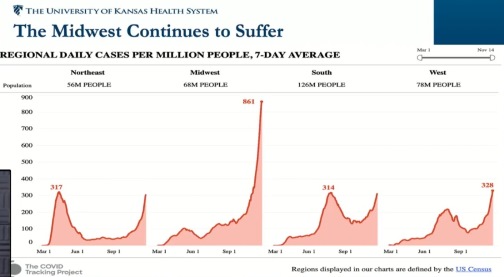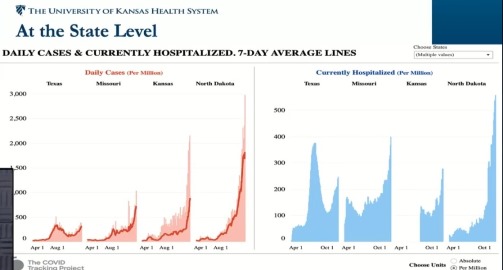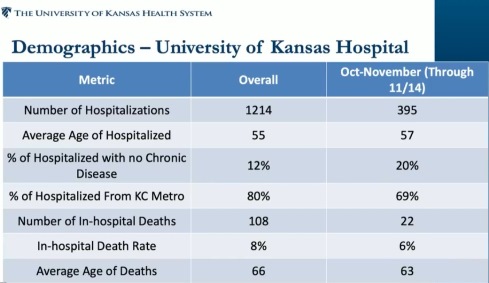


The University of Kansas Health System in Kansas City, Kansas, is seeing a surge of COVID-19 patients today, with 125 COVID-19 patients in the hospital, according to doctors at a news conference Monday morning.
There were 80 COVID-19 patients with acute infections in the hospital Monday morning, up 13 since Friday morning, according to Dr. Dana Hawkinson, medical director of infection prevention and control. There were 31 patients in the intensive care unit, up nine from Friday morning, and 11 on the ventilator, up four from Friday morning.
There were another 45 patients who had COVID-19 when they came in, and are considered to be out of the acute infection stage, according to Dr. Hawkinson. That number is up 17 from Friday morning’s total.
There also has been a surge in COVID-19 patients at HaysMed in Hays, Kansas, he said.
Dr. David Wild, vice president of performance improvement at KU Health System, said the number of cases and hospitalizations is increasing in the nation, in the Midwest, and in Kansas and Missouri, as well as in the Kansas City area and at KU hospital.
The Midwest case numbers per million are triple that of New York at its peak, according to Dr. Wild.
In Kansas, the case numbers have increased in nearly a vertical line on a graph in the past seven days, he said. For hospitalized patients per million, Kansas and Missouri are now worse than Texas in number of hospitalizations per million persons, according to Dr. Wild.
With the number of cases increasing each day, they expect the next seven to 14 days will be much worse for hospitalizations, Dr. Wild said.
All of the things they were worried that could be possible in March, April and May are actually happening right now, he said.
“And that should be scary for all of us,” Dr. Wild said.
Besides being limited by the number of beds they are licensed for, hospitals also are limited by the staff available who can staff the beds. About 400 KU Health System employees were currently out because of a positive test or a pending test result, according to Dr. Wild. The doctors said they know from contact tracing the employees got it from community spread, not from work. They may have been at activities or gatherings, or got it from a spouse or child, according to the doctors.
KU Health System and St. Luke’s Health System announced last week that they would start moving back some selected surgeries because of the higher numbers of patients in the hospital.
Dr. Steve Stites, chief medical officer at KU Health System, said the Kansas City hospital is about a week behind the COVID-19 situation in Wichita.
Dr. Garold Minns, dean of the KU School of Medicine in Wichita, said hospitalizations in Wichita are at a peak. They are up to 24 percent positivity on testing, he said, where they were around 5.3 percent in early September, he said.
“It’s very similar across the state, in the metro areas,” he said.
A new order was issued last week in Wichita, he said, but unfortunately, a lot of people don’t accept COVID-19 as real. There is mediocre compliance with the mask mandate. There are potential penalties for not wearing masks, but apparently no enforcement, he added. Retail businesses are being asked to take responsibility for making sure there is compliance with the mandate.
Some of the major hospitals in Wichita are trying to move all surgeries to a second campus, and keep COVID-19 patients at one of their sites, he said. They haven’t decided yet to stop elective surgeries.
The hospitals in Wichita have had to cut off referrals from Oklahoma and other areas, he said, because they are being flooded with local numbers. Physicians in rural Kansas are frustrated because if they need an ICU bed for any reason, they are having to make eight to 10 calls to find one, he said.
While there are more restrictive measures being considered at the local government level throughout the Kansas City area and Midwest, the doctors on Monday morning agreed that it would take personal responsibility on the part of people to reduce the spread of COVID-19.
“The people are really resisting the basics,” Dr. Stites said.
“They’ve had mixed messages,” Dr. Minns said. “We don’t need to go into that in any detail, but I can see where some people are confused and not know what to believe.”
Kansas City, Missouri, may announce more restrictions on Monday, and Johnson County announced more restrictions last week on the number of people who can gather.
“I think we have to get real serious about this,” Dr. Stites said. “Unless we get really serious about that, and not have many exceptions around masking and personal behavior, I think we will struggle as a community to take care of people who are ill. That’s with or without COVID.”
It could affect the ability of people without COVID-19 to get the treatment they need, according to Dr. Stites.
Dr. Hawkinson said it’s not as much about sitting in a restaurant right now, but it boils down to individual behavior. They are concerned about people getting together with five or six friends, or taking a small trip with them.
Recognizing they can’t get together with them right now would be important, Dr. Hawkinson said. More of the spread is taking place now in private settings, he said.
“We can’t have a rule that will address every situation,” Dr. Wild said. “What we really need is each and every member in the community to really understand what they do is the important part of the conversation.
“This is about the behavior we’re seeing, not necessarily about whether the rule is strict enough or not strict enough,” he said.
Public health orders are helpful, but he issued a passionate beg to individual members of the community.
“We don’t need to shut down every business in the community to manage this, but we are going to have to make some sacrifices, and it starts with each of us,” Dr. Wild said.
The doctors also discussed vaccines on Monday, as Moderna has announced that its vaccine’s early findings showed over 94 percent effectiveness. Two vaccines, one by Pfizer and one by Moderna, look really good, Dr. Stites said. Also KU Health System is starting to give monoclonal antibodies to COVID-19 outpatients today, Dr. Stites said.
“We’re almost there, don’t fumble the ball at the goal line,” Dr. Stites said.
“If we work together, we can get through it together. If we decide we are our own individual agent and we can do anything we please, we will suffer the consequences of that decision,” Dr. Stites said. Those consequences include illnesses, deaths and permanent damage of lungs and other organs for many people.
To view the news conference, visit https://www.facebook.com/kuhospital/videos/2671600526395801.
